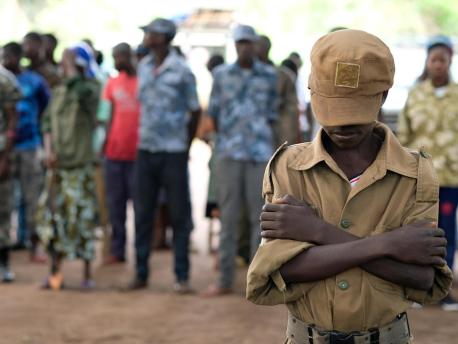
UNICEF Is Working to Free Child Soldiers Around the World
The recruitment of children and use of childhood soldiering during conflict is one of the six grave violations of international law identified and condemned by the United Nations Security Council, yet tens of thousands of children in war are being killed, maimed, subjected to sexual violence and forced to fight in armed conflicts around the world.
The UN's annual report on Children and Armed Conflict monitors the violation of children's human rights in 20 conflict-ridden countries and cites verified cases of recruitment and use of children in the Central African Republic, the Democratic Republic of Congo, Somalia, South Sudan, Nigeria, the Syrian Arab Republic and Yemen, among others.
In the video below, James describes how he was abducted by militia members in South Sudan when he was 14 and forced to become a child soldier. "They told me, 'Fight for us, or die.' I tried to escape and run away, but they stopped me," he says. "I had to fight against my own people. I closed my eyes every time I had to fire. I didn't want to hit someone from my village."
For six months, James was forced to fight. Wounded in a gun battle, he was left for dead and woke up days later in a hospital in Juba, far from home. UNICEF helped him recover and eventually reunite with his mother and six sisters. Three years after he disappeared, James was finally home again.
Armed groups and armed forces still use thousands of children in South Sudan. UNICEF South Sudan is advocating with the government and armed groups to end and prevent the recruitment and use of children in conflict. On February 26, 2020, 15 boys associated with armed forces and armed groups were released in South Sudan. Ranging in age from 16 to 18, the boys were taken as prisoners of war during clashes in the northern part of the country in 2019.
UNICEF and partners protect children who have been released by armed groups, and help them find their families
Their release, supported by UNICEF, the UN Mission to South Sudan and the National Disarmament, Demobilization and Reintegration Commission, represents the end of their imprisonment and the start of a new life. The boys will live in an interim care center where they will receive counseling and help finding their families and reintegrating into their communities.
On Feb. 12, 2019, 119 children were released by an armed group in Yambio, South Sudan. The group included 48 girls; the youngest child released was 10 years old. "Every child no longer with an armed group represents a childhood restored and a future regained," said UNICEF Executive Director Henrietta Fore.
UNICEF's reintegration program for former child soldiers is critically underfunded
Around the world, UNICEF has helped more than 8,700 children released from armed groups readjust to civilian life and find their families since 2017. UNICEF and partners provide released children with medical care, counseling, education, vocational training and a safe place to live while they recover from the trauma they've experienced.
"There are no shortcuts in reintegration if we are serious about preventing re-enrollment and ensuring a new direction in life," said Dr. Mohamed Ag Ayoya, UNICEF Representative in South Sudan. "Yet our well-established reintegration program is critically underfunded and in danger of being closed down unless new funding becomes available."
For 2020, UNICEF has appealed for US $4.2 million to support the release of some 2,100 children associated with armed forces and armed groups and the continuation of the reintegration program for formerly and newly released children in South Sudan.
Please support UNICEF's work around the world to free child soldiers and reunite them with their families.
Top photo: With UNICEF's support, more than 200 children were released from the ranks of armed groups at a ceremony in Yambio, South Sudan in April 2018. Children in UNICEF-supported reintegration programs receive medical care, counseling, vocational training and a safe place to live while they readjust to civilian life. © UNICEF/UN0202133/Rich
HOW TO HELP
There are many ways to make a difference
War, famine, poverty, natural disasters — threats to the world's children keep coming. But UNICEF won't stop working to keep children healthy and safe.
UNICEF works in over 190 countries and territories — more places than any other children's organization. UNICEF has the world's largest humanitarian warehouse and, when disaster strikes, can get supplies almost anywhere within 72 hours. Constantly innovating, always advocating for a better world for children, UNICEF works to ensure that every child can grow up healthy, educated, protected and respected.
Would you like to help give all children the opportunity to reach their full potential? There are many ways to get involved.




